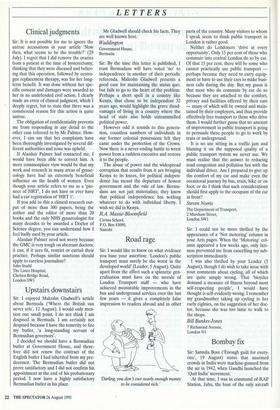Road rage
Sir: I would like to know on what evidence you base your assertion: 'London's public transport must surely be the worst in the developed world' (Leader, 5 August). Quite apart from the effect such a splenetic gen- eralisation must have on the morale of London Transport staff — who have achieved measurable improvements in the bus and underground services over the last few years — it gives a completely false impression to readers abroad and in other 'Darling, you don't owe nearly enough money to be considered rich.' parts of the country. Many visitors to whom I speak seem to think public transport in London is rather good.
Neither do Londoners 'drive at every opportunity'. Only 15 per cent of those who commute into central London do so by car. Of that 15 per cent, there will be some who cannot practically use public transport — perhaps because they need to carry equip- ment or have to use their cars to make busi- ness calls during the day. But my guess is that most who do commute by car do so because they are attached to the comfort, privacy and facilities offered by their cars — many of which will be owned and main- tained by their employers, and thus provide effectively free transport to those who drive them. I would further guess that no amount of improvement in public transport is going to persuade these people to go to work by train or underground.
It is no use sitting in a traffic jam and blaming it on the supposed quality of a public transport system we never use. We must realise that the answer to reducing road congestion and pollution lies with the individual driver. Am I prepared to give up the comfort of my car and make even the occasional journey by bus, train, bike or on foot; or do I think that such considerations should first apply to the occupant of the car in front?
Steven Norris
The Department of Transport, 2 Marsham Street, London SW1


















































 Previous page
Previous page